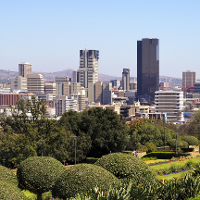09 December 2015
IIASA wins science diplomacy award
The Science Forum South Africa Science Diplomacy Award was conferred on IIASA in association with the IIASA South African National Member Organization, the National Research Foundation (NRF), under the category recognizing “an international partnership which has achieved excellence in global science.”
The awards committee praised IIASA for applying science to find solutions to global problems through applied systems analysis, thereby improving human wellbeing and protecting the environment.
“We are honored by this important and meaningful award,” said Director General and CEO Professor Dr. Pavel Kabat. “Here at IIASA we greatly value our collaboration with South Africa, and we accept this award with our full intention to enhance our already very fruitful collaboration even further!”
Kabat is speaking in the opening plenary panel of the Science Forum South Africa in Pretoria this week, as well as in the session to discuss how systems analysis can help government planning. He will be joined by Professor Mary Scholes of the University of the Witwatersrand, who is also Chair of the IIASA Science Advisory Committee and Dr. Gansen Pillay, who is Deputy CEO at the South African National Research Foundation and IIASA Council Member for South Africa.
South Africa has been a member of IIASA since 2007. During this time a range of research and capacity building activities have been developed by IIASA and over twenty South African research partners to strengthen and support the development of systems analysis in the country.
Earlier this year, Minister Pandor visited IIASA to discuss and strengthen cooperation between IIASA and South African institutions. In South Africa, Kabat will also be playing a key role in an institutional review of NRF as a member of an international panel tasked with compiling the synthesis report on the NRF.
Research to support science diplomacy
IIASA was established in 1972 to use scientific cooperation to build bridges across the Cold War divide and research growing global problems on a truly international scale. Today the soft power of science diplomacy continues to help IIASA member countries through using scientific cooperation to improve international relations, and through international teams jointly researching controversial issues to find consensus such as through integrative assessments of the future for the Arctic or of the economic integration of Eurasia.
In addition, IIASA also maintains its original bridge-building objective through attracting member countries that represent a range of geo-political interests (see full list of members). For instance, both Russia and the US are members; as are Brazil, China, India, and South Africa. Several key factors also unite all IIASA member countries: their interest in systems analysis, scientific and academic infrastructure, economic stability and the geopolitical role in future global transitions. With this in mind, IIASA is also exploring closer collaboration with countries in the Middle East including Iran and Israel.
IIASA activities with South Africa


